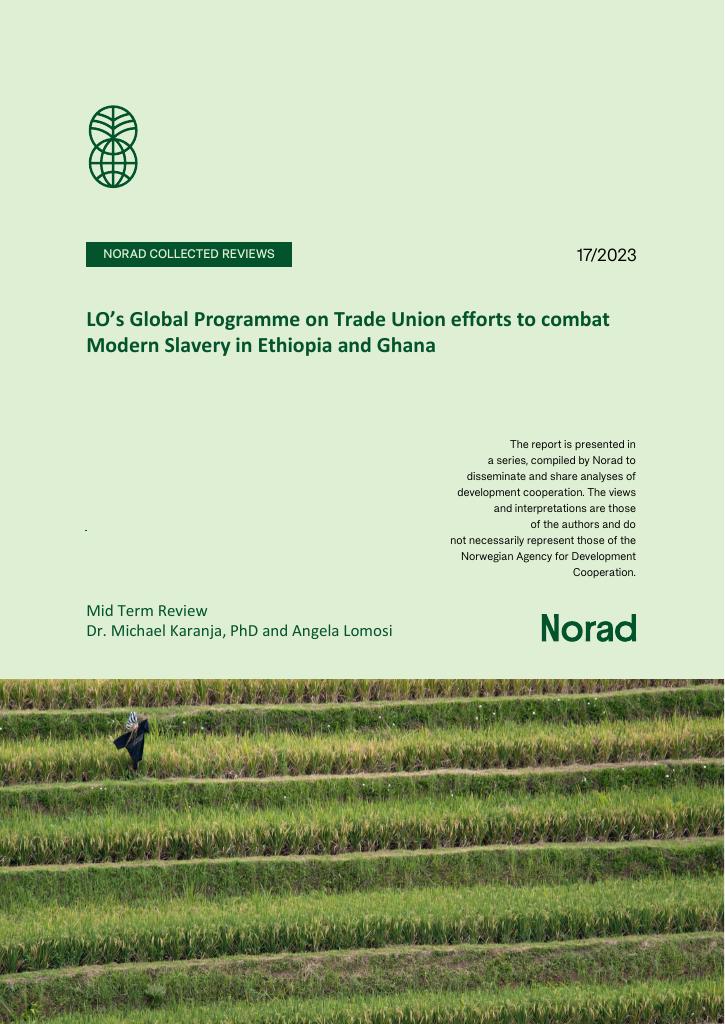Evaluering
LO’s Global Programme on Trade Union efforts to combat Modern Slavery in Ethiopia and Ghana : Desentralisert evaluering/Norad Collected Reviews
The LO-Norway global Program on trade union efforts to combat modern slavery in Ethiopia and Ghana is a three-year programme that aims to reinforce the legal instruments and policies on child labour, forced labour and trafficking; mobilize trade unions to be a constructive partner for companies in preventing child labour and forced labour, and protect vulnerable groups against modern forms of slavery. The program commenced in March 2020, and this mid-term evaluation of the programme was carried out during December 2022 with the shared desire to review the overall implementation of the programme and evaluate the effectiveness and efficiency of the cooperation. It was an evaluation of the programme to learn and improve conditions for enhanced implementation during the remaining programme period. The review process was guided by questions focusing on the relevance, efficiency, challenges, and sustainability of the cooperation. It was noted that there is a discrepancy between the planned results and the budgeted activities in Ethiopia. The CMS project was supposed to leverage on the Decent Work Program but the coordination between the two projects has been weak yet crucial for success as per the theory of change. In Ghana, there is good collaboration with the Decent work program and the results framework and targets are well elaborated and feasible. The key results or contributions of the LO funded programme to the status of child labour, forced labour and trafficking in Ethiopia and Ghana include among others; Behavioural change among communities: Communities previously hotspots of child labour such as fisher folks are ending a tradition that had been done for many generations and taking children to school. In Ethiopia, child labour in the agricultural sector especially the weaving industry has drastically reduced. Enhanced collaboration between stakeholders to tackle issues of child and forced labour and trafficking has created more interest among informal groups who are expressing interest to organize for legal protection. Increased visibility: The programme has made the trade unions more visible to stakeholders and added new knowledge. The role of the trade union is better understood in the rural communities and informal sectors, that they have trained and interacted with. Government is recognizing the role of trade unions. They have become key partners in combating modern slavery, and are being consulted on issues of modern slavery, child trafficking, forced labour and child labour. Enhanced awareness and advocacy on modern slavery: The programme is contributing to raising awareness and advocacy on issues of modern slavery labour in the communities and among beneficiaries of the trainings. Enhanced collaboration among actors. There is concerted action for collaboration with other actors in the field of child labour, forced labour and human trafficking particularly employers, non-governmental organizations, the ILO, government officers to influence policy are very commendable and steps in the right direction in influencing policy. Formation/membership of coalitions and consortiums to influence policy are applauded as the magnitude of the problem requires collaboration. Lobbying employers for inclusion of issues of modern slavery in workplace policies is a good practice in ensuring sustainability of results achieved so far. Evidence based programming. Studies on modern slavery components i.e. human trafficking, child labour and child labour has been conducted in both Ghana and Ethiopia and the reports used in programming. The messages sourced from the studies have been used in training facilitation, awareness meetings and programmes such as radio, in advocacy meetings and to develop IEC materials. Improved legislation: There is a lot of improvement in the policy development and legislation in this area. The CETU and TUC are part of the process, and being in the legislation committee, it makes it is easier to make their contribution as well as to follow up.
